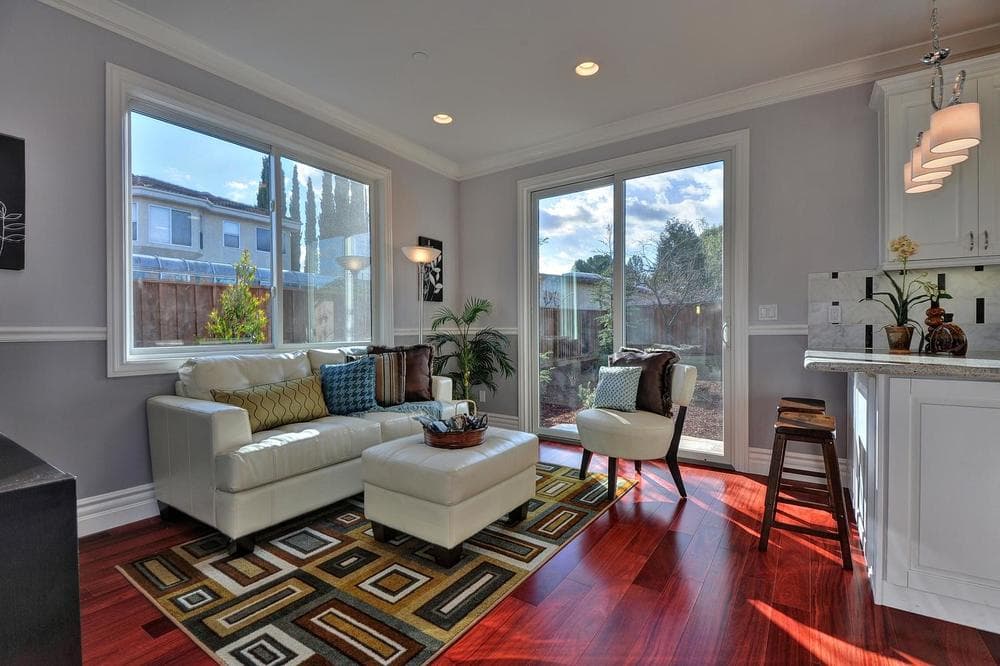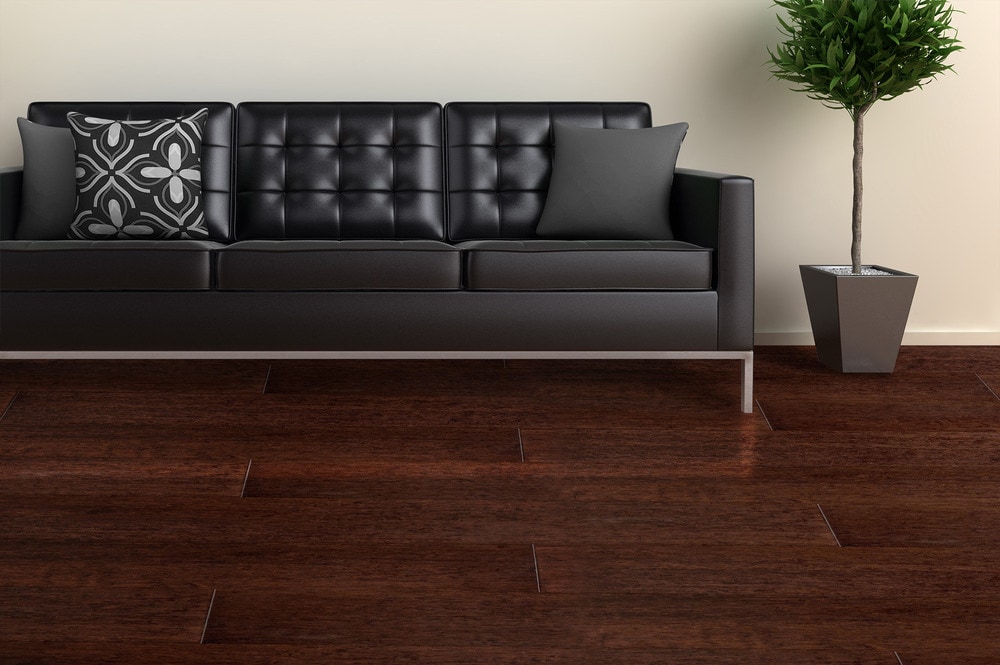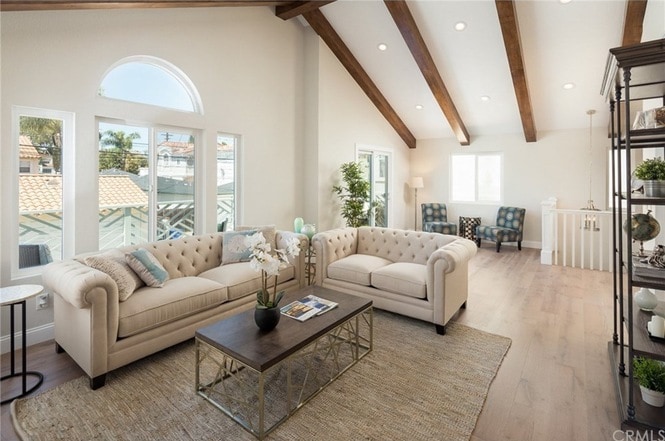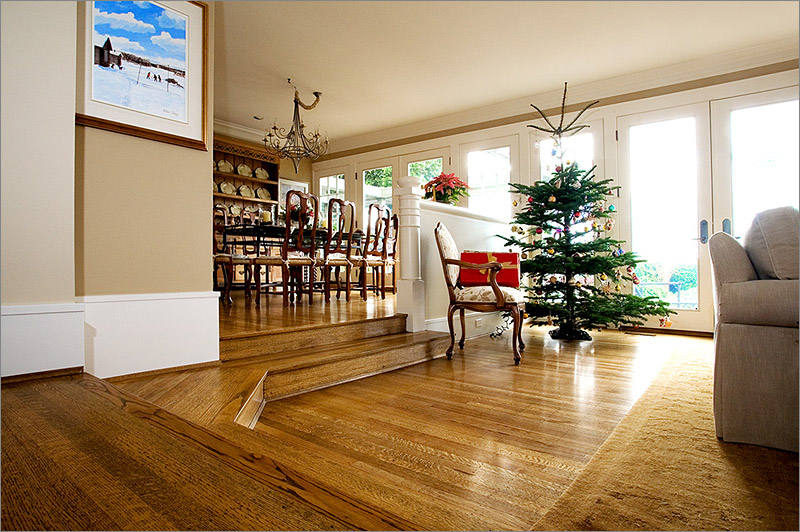Hardwood Buying Checklist
Mazama Hardwood – Smooth South American Collection / SKU: 10080076
Our hardwood flooring checklist will help you understand what you need to know before purchasing this amazing flooring option. This article will help you get all your facts in line so that you can make the most informed choice and get the most for your hardwood flooring dollar.
To start, here’s a brief video that goes over some of the absolute basics when it comes to buying hardwood floors. It touches on character, flooring board dimensions, hardwood photosensitivity, possible color changes, and surface hardness. Click on the button below to watch the video and kick off the hardwood flooring checklist!
Is Hardwood the Right Floor for You?
There are a number of questions you must ask before knowing whether or not a hardwood floor is the best choice for you. Hardwood offers a lot of advantages and only a few disadvantages. If you are unsure if hardwood is the best choice, learn if hardwood is right for you.
Once the decision to buy a hardwood floor has been made, several other things must be considered before the flooring can be bought and installed. Asking these questions beforehand will help to prevent a potential disaster in the long run.
What is Best for My Situation? There are a number of things to consider that will help you determine what is best for your project.
Where is the room located? Is the room below grade, on grade or above grade? Standard solid hardwood cannot be installed below grade, but thin profile solid and engineered hardwood can both be installed below grade.
What is the purpose of the room? What will the room be used for? Rooms subject to moisture exposure will be better off using an engineered hardwood rather than a solid – and if they are subject to high levels of moisture (e.g. a bathroom), they are probably are not suited for a hardwood floor at all.
Are you installing over in-floor radiant heating? Solid hardwood cannot be installed over radiant heating. However, most engineered hardwood floors are suitable for installation over radiant heating.
What will the traffic be like in the room? If the room is one expected to receive high traffic volume, the species of flooring will likely need to be a harder wood. Though it’s true that wood floors are going to respond to how they are cared for and both a hard and soft wood will show age if not properly maintained, harder woods subjected to high traffic are less likely to show wear and tear when they are cared for correctly.
Are there children or pets in the home? Children and pets are likely to be hard on the flooring, so choosing a durable species is important. Pets’ claws will scratch the surface, and children will spill and run their toys across it. Take extra precautions to ensure the floor is protected.
Does the room contain a door to the outside? If the room contains a door to the outside, dirt and other debris will make its way into the room, scratching the surface of the flooring and making it show wear and tear much sooner than other rooms without a door to the outside. Be sure to use non-staining rugs and doormats in the room to lessen the chance of damaging debris being strewn throughout the room.
What is the “feel” of the room? There are several potential “feels” one can create for a room. If the room is casual, certain hardwood choices and grades will be better than others, and the same is true if the room has a more formal feel to it. Two examples of different styles are smooth, elegant select and better grade versus a hand scraped, more antique look. This, in combination with the colors and styles, will help make a final hardwood choice.
How much exposure to sunlight does the room get? If there are many different windows where sunlight will come through, this is important to consider because extended exposure to sunlight will lead to discoloration of certain light sensitive hardwood species over time. To combat this, look for a UV coated floor and/or rotate furniture and rugs in the room to prevent any one area of the floor from getting too much sunlight for too long.
How much do I need? Determining what you need is relatively easy. Measure the dimensions of the room in which you’ll be installing the floor and multiply length x width to get the total square footage. Always make sure to order 10% more than you need. This will cover off any boards that come damaged or become damaged during the installation process. It also provides you with some extra in the event you need to make a future repair. If you’re not sure how to calculate your square footage need you can always ask your dealer for help.
What Type of Hardwood does the Seller Offer?
Second on our hardwood buying checklist is options. The seller should be able to tell you the various hardwood options they offer and at what price range.
Do they offer solid and engineered hardwood? Solid hardwood is all hardwood. Engineered uses a plywood or high density fiberboard core with a layer of real, solid hardwood on the top. While engineered hardwood flooring, is better suited for areas subjected to additional moisture and, unlike solid hardwood, can be installed below grade or over concrete, it can only be sanded and refinished a limited number of times before it must be replaced, depending on the thickness of the wear layer. Consider which room of the home where the flooring will be used before making this choice.
Do they know how the flooring is manufactured? For solid hardwood, is it flat sawn, quarter sawn or rift sawn? The way it is made will affect price, but it will also have an impact on durability. Flat and quarter sawn planks have an increased chance of trying to revert to their natural shape, which leads to cupping and crowning of the flooring over time. For engineered, how
Do they offer formaldehyde-safe engineered hardwood? Engineered hardwood is made by gluing together a plywood or high density fiberboard core with a real hardwood veneer. The adhesives used must meet safe emissions standards for indoor air quality, such as E1 or E0 class or be CARB-compliant. The seller should have this information.
What species do they have? Some people prefer a certain species of hardwood regardless of the other factors. Narrowing the spectrum down to one or two different species will help the hardwood buying process along. Each species has a different hardness, as measure by the Janka Hardness Scale. What does the seller recommend for your situation?
What grades do they have? While there is no universal grading system in place for hardwood flooring, each manufacturer usually sets one in place to describe the appearance of the hardwood in the box. If pinholes, knots, and color variations are not a concern, lower grade floors are the way to go. If people are looking for flooring with little color variation, and little natural character with knots and pinholes, higher grade flooring will be necessary. Discuss the grading system in use with each manufacturer with a sales representative.
Do they offer different surface textures? Besides a smooth, machine milled texture, there are a few other options which will add a touch of decor and character to the room. Distressed hardwood, either by hand or by machine, gives the wood an antique , character look which may be the perfect choice for you. Discuss these options with the sales representatives to see the differences between the styles.
What color choices do they offer? If the flooring is tying together other elements of decor, choosing a floor based on its color and style may narrow down the options. If there is a certain color or style to keep in mind, alert the sales representatives for help.
Can I install the product myself, or should I hire a professional? There are several options when it comes to installing a hardwood floor and the seller should be able to tell you which products are easy to install and which ones may require hiring a professional installer. You may wish to choose a product based on how it can be installed.
What is included in the warranty? Your hardwood floor will be guaranteed against defects. Most hardwoods come with a finish warranty and a structural warranty against defects in the product. Some warranties cover a decade others are lifetime warranties. In general, the longer the warranty, the higher the price. Try to pick the hardwood with the warranty you’re most comfortable with. In other words, read the warranty before you buy.
Jasper Engineered Hardwood – Baltic Oak Collection / SKU: 15001759
Here are some useful links:
How Hardwood Flooring is Made – learn how both solid and engineered hardwood are made and how this affects price.
Hardwood Types and Grades – learn about the different construction types, installation options, textures and more
Hardwood Species – learn about the different species and their unique characteristics
Janka Hardness Scale – learn the relative hardness of the different species of hardwood
Colors, Finishes and More – learn about the finer details of hardwood flooring, including color options, finish types, edge details, lengths, widths, inlays and installation patterns.
Moldings, Trims and More – learn about the different types of moldings, trims and transition pieces you will need to complete your project
Where Should I Buy My Hardwood Floor?
Another consideration in the hardwood buying checklist lies in where the purchase will be made. There are many offline traditional brick and mortar establishments; however, making the purchase online may provide additional cost savings.
Either way, it is best to go with someone who you feel is knowledgeable and that you can trust. Beyond product knowledge, the question below may help you decide who is the best choice to buy from.
Can I take home a sample? Samples are vital to decision making. You may not only want to take a sample home but you may want to take home and keep more than one sample, depending on how long it takes you to make your final decision. Some retailers will offer you a sample book that you can borrow, while others ask you to pay a nominal $2-$5 refundable fee per sample. Others will offer you free samples. Do what's right for you and make sure you don't feel rushed.
How much will it cost? Most hardwood flooring is warehoused in varying locations across North America. Some retailers have warehouses themselves and ship directly from there. One way or another, the cost of warehousing (and sometimes the cost of shipping) ends up in the cost of your product. So finding out the final, delivered price with taxes, duties (if any) and shipping is the best way to comparison shop by price. The final price you pay for shipping and delivery will depend, to some degree, on all these factors and especially on how far your job site is from where the product is stored or manufactured. Be sure to compare final, delivered prices when comparison shopping.
Is there a minimum order? Some retailers set minimum orders some don't. Or there may be minimum orders on certain products. Large minimum orders are usually indicative of better pricing. Check with your seller.
What about matching moldings, trims and accessories for my hardwood floor? You'll probably need matching moldings, trims and transition pieces for your hardwood floor. You may also need accessories such as underlayment and adhesives depending on the type of hardwood floor you buy. Does the seller offer these or do you have to source them separately?
What about financing? Redoing your floors can be expensive. That's why some people opt to pay for their new flooring over time. If you prefer to buy your floors this way then you'll have to find a retailer that offers you financing. For example, BuildDirect and Affirm recently partnered to offer easy monthly payment plans with flexible options.
Is there a return policy? Some sellers will not accept returns at all, while others have very flexible return policies – in some cases even paying return shipping costs. It's a good idea to review the vendor's return policy before making your purchase.
What if there are damages upon delivery? When it comes to damages, your retailer should rectify whatever problems might arise to your satisfaction. Whether that's a money-back guarantee or replacing the damaged products, your retailer must ensure the quality of the product you buy. However, you must also be aware that a good rule-of-thumb is to order 10% more than you think you need. This ensures you’ll have enough material in case of a few damaged boards as well as having enough in the event you need to make future repairs.
What if I’m not happy with my hardwood floor once installed? You're already aware of the manufacturer's warranty but the problem you're having with your floor isn't about that. It's about… well, the fact that you don't like your floor. What will your retailer do for you? Picking your hardwood floor can be difficult and if you make a mistake with the color or style, you'll have to alert your retailer before you install it. Some vendors have a policy that will cover this, others won't. However, virtually no one will let you return your floor once it's installed. Make sure you're sure before you install!
We hope this hardwood buying checklist has been helpful! Bookmark it for future reference during your buying process.









tommy kennedy
I like the Brazilian cherry premier tungsten 1200 sq ft
Carpets for Less
Buying anything online is not always as easy as it might first appear. There are usually concerns to deal with which are not considered initially, things which just come up and mess with an otherwise fine transaction. Shipping costs, purchasing contract, getting the wrong product and not getting as much as you thought you were getting are all real problems which some people fail to think of before making a purchase decision.
Johnston Chu
Is the thickness of theveneer layer of the engineered hardwood floor listed on the product?